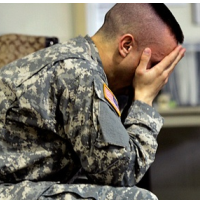PTSD in Soldiers Found to be linked to a War’s Level of Morality
 (photo: Carolyn Kaster, AP)
(photo: Carolyn Kaster, AP)
Post-traumatic stress disorder (PTSD) may be linked to more than the combat of war, but also to actions that violate a soldier’s sense of morality, according to new research.
The study, which will be published in the April issue of the Personality and Social Psychology Bulletin, found that PTSD levels can be influenced by the amount of support the nation has for the war itself, which can impact the perception of the conflict’s moral standing. Although citizens may express support for their nation’s troops, a wide lack of support for the war being fought—such as displayed through anti-war protests—can cause a soldier to feel that his actions may be in violation of what is morally correct. The result is an increase the level of PTSD in that soldier.
“What we would suggest, however, is that it is not protest, per se, that puts a soldier’s mental health at risk, but the initial decision to go to war,” David Webber of the University of Alberta and the study’s lead author told Raw Story. “War protest usually only occurs when that war is unfounded. If war is enacted for legitimate reasons, the public will usually support that effort.”
Moral injuries that soldiers bring home from war are similar, but not identical, to those sustained during combat. These problems can include deep shame, guilt and rage.
“The clinical psychological literature suggests that a key factor in PTSD experienced by soldiers at war is the guilt that is experienced from perpetrated acts of violence that violate moral standards,” said Webber. “This is why in our study we focused on guilt-related symptoms. In the sense that killing is deemed immoral in most cases, and soldiers are asked to kill, it’s only if a soldier is able to view that killing as different or acceptable (i.e., moral), that guilt should not arise.”
Retired Colonel Elspeth Ritchie, former psychiatry consultant to the Army surgeon general and currently the chief clinical officer at the District of Columbia's Department of Mental Health, told the Associated Press that moral injuries are not a medical problem, which can make them difficult to treat.
There is a view that, in spite of overlapping symptoms, moral injury—which isn’t necessarily caused by an actual traumatic event—is not the equivalent of PTSD, which is generally associated with nightmarish memories of frightening combat experiences. Not differentiating between the two “renders soldiers automatically into mental patients instead of wounded souls," stated Tyler Boudreau, a former Marine captain and Iraq veteran, who resigned for reasons of conscience. “It’s far too easy for people…[to] donate a few bucks and whisk them off to the closest shrink...out of sight and out of mind," he wrote in The Massachusetts Review.
-Danny Biederman, Noel Brinkerhoff
To Learn More:
Researchers Link ‘Unfounded’ Wars to Increased Risk of PTSD (by Eric W. Dolan, Raw Story)
Beyond PTSD to "Moral Injury" (by Jeff Severns Guntzel, American Public Media)
Veterans Suffer 'Moral Injury' from Warfare (by Pauline Jelinek, Associated Press)
Can Post-Traumatic Stress Disorder be Applied Retroactively? (by Noel Brinkerhoff, AllGov)
Number of Americans Wounded in Iraq is Obscured by Fog of War…and Peace (by Noel Brinkerhoff, AllGov)
Veterans Groups Clash with VA over PTSD Diagnosis (by Noel Brinkerhoff, AllGov)
- Top Stories
- Unusual News
- Where is the Money Going?
- Controversies
- U.S. and the World
- Appointments and Resignations
- Latest News
- Trump Renames National Football League National Trump League
- Trump to Stop Deportations If…
- Trump Denounces World Series
- What If China Invaded the United States?
- Donald Trump Has a Mental Health Problem and It Has a Name






Comments